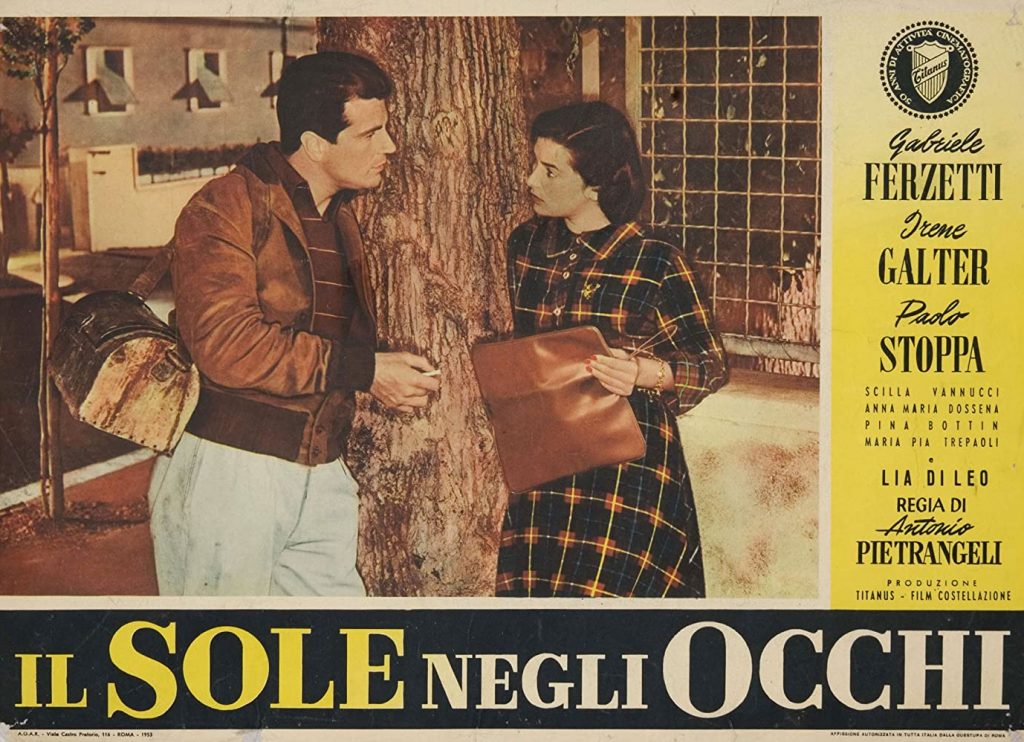One of the most mature, convincing and personal directorial debuts of post-war Italian cinema
Pietrangeli paints the first of his many splendid and complex portraits of female characters
Il sole negli occhi is one of the most convincing directorial debuts of post-war Italian cinema. Upon its release, critic Gian Luigi Rondi wrote: “It is not difficult to recognise all the authority and self-confidence usually found in more experienced directors.” Antonio Pietrangeli admirably constructs an intense story, masterfully combining meditative originality with skilfully handled moments of comedy and an eye for detail more akin to a director of documentaries, to take us right inside the peripheral world inhabited by maids in suburban Rome. Without ever preaching, he paints a precise picture of the social reality, characterised by an exhausting urban environment, work exploitation and loneliness. Above all, even at this early stage of his career, the film fully demonstrates Pietrangeli’s sensitivity in portraying female characters: the Celestina of Sole negli occhi, very lost but yet very stubborn, is cut from the same cloth as the splendid and complex females that populate his later works, from Io la conoscevo bene to Adua e le compagne.
Young Celestina leaves her hometown for the first time to travel to Rome and become a maid. For a variety of reasons, she is forced to change house and employer a number of times. Throughout everything, she remains friends with Marcella, another maid, and has a romantic relationship with plumber Fernando, who gets her pregnant. However, after Celestina returns from a holiday her employers have been on, she discovers that Fernando has married another girl. After attempting to commit suicide, she decides not to listen to his pleas for forgiveness, and to start a new life with her son.
One of the most mature, convincing and personal directorial debuts of post-war Italian cinema
Pietrangeli paints the first of his many splendid and complex portraits of female characters
Il sole negli occhi is one of the most convincing directorial debuts of post-war Italian cinema. Upon its release, critic Gian Luigi Rondi wrote: “It is not difficult to recognise all the authority and self-confidence usually found in more experienced directors.” Antonio Pietrangeli admirably constructs an intense story, masterfully combining meditative originality with skilfully handled moments of comedy and an eye for detail more akin to a director of documentaries, to take us right inside the peripheral world inhabited by maids in suburban Rome. Without ever preaching, he paints a precise picture of the social reality, characterised by an exhausting urban environment, work exploitation and loneliness. Above all, even at this early stage of his career, the film fully demonstrates Pietrangeli’s sensitivity in portraying female characters: the Celestina of Sole negli occhi, very lost but yet very stubborn, is cut from the same cloth as the splendid and complex females that populate his later works, from Io la conoscevo bene to Adua e le compagne.
Young Celestina leaves her hometown for the first time to travel to Rome and become a maid. For a variety of reasons, she is forced to change house and employer a number of times. Throughout everything, she remains friends with Marcella, another maid, and has a romantic relationship with plumber Fernando, who gets her pregnant. However, after Celestina returns from a holiday her employers have been on, she discovers that Fernando has married another girl. After attempting to commit suicide, she decides not to listen to his pleas for forgiveness, and to start a new life with her son.

